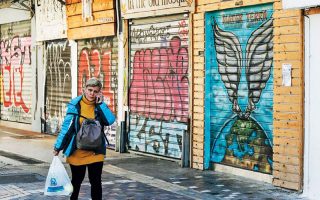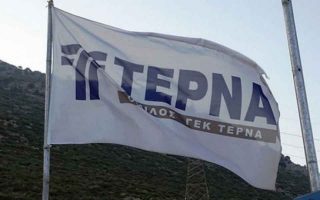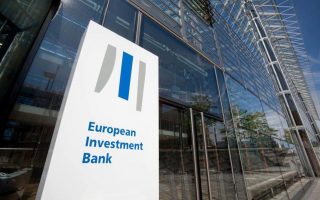Solidarity is key as businesses enter uncharted waters

Up until a few weeks ago, 2020 was seen by everyone as a year of high growth, when the presence of Greek companies was being consolidated in the markets, which would finance their investment programs at low cost.
However, within just a short period of time, it turned into a nightmare. The future is uncertain. The economy is in uncharted waters, says one of the businessmen who spoke to Kathimerini.
The blow will be strong for everyone: the state, workers and businesses. How deep the impact will be depends on the duration of the pandemic. For some sectors, such as tourism, 2020 will, more or less, be a lost year, and to some extent the effects will also be tangible in 2021. The most important thing for all businesspeople now is, firstly, to tackle the pandemic by all means and to limit human casualties.
There is general agreement that the measures taken so far to contain the spread of the coronavirus are in the right direction, as are the interventions to mitigate the immediate economic impact. The preparations for the day after must begin with planning policies to get the country back on a track of growth. The cooperation of the state, businesses, banks and institutions is a prerequisite.
“We – the state, businesses and employees – must outdo ourselves so that with an intense and persistent effort, even greater than usual, we will reduce the financial impact of the crisis. It is incumbent on all of us to prepare now for a dynamic relaunch of the Greek economy,” says GEK Terna Group Chairman Giorgos Peristeris.
The role of banks will be particularly critical, as “the period immediately after the acute phase of the pandemic will require a massive response – i.e. a massive liquidity boost for the economy to heal the wounds that are sure to be created, as soon as possible,” said Fokion Karavias, chief executive at Eurobank.
Greek Tourism Confederation (SETE) President and Electra Hotels CEO Yiannis Retsos
With solidarity
Along with the rest of Europe, Greece is experiencing the outcome of an unprecedented and asymmetrical war whose key features are that its consequences and its global dimension are unprecedented.
As president of SETE, I never tire of emphasizing that public health is our main priority. The outcome of this will also determine our course in the future.
Greek tourism not only faces a battle for its survival but also has to prepare itself for the day after, when it will have to hit the ground running. The government has been responsible and flexible in its response, introducing a first batch of measures aimed at supporting the liquidity of tourism companies.
We will now have to evaluate every new stage as it happens with a systematic and responsible plan and of course with new measures – every single day. Our response to date has been better, more organized and more humane compared to our traditional tourism competitors. If each of us does our part, then all of us will sooner or later recover. Business owners and employees will succeed in this if they join forces, with responsibility and compliance, with collective conscience and solidarity.
AVAX Chairman Christos Ioannou
Uncharted waters
We are living something unprecedented, that we had never imagined. In the midst of this tragic event, we are fortunate that the country’s response to the pandemic was quick. It was one of the few times that we have been able to feel proud and united about Greece’s response compared to its European peers.
There was some poorly directed criticism of people who, for one day only, went to the beach, to the cafes and ski centers and underestimated the authorities’ call to stay home from the first moment. I personally feel that the serious effort which is taking place has rallied people behind a common purpose; Greeks have never been so disciplined. Fear appears to have overpowered the tough-guy mentality. It does no good to focus on a few exceptions, it does not unite us and it cannot devalue the serious effort of the great majority.
Economically speaking, we are unfortunately entering uncharted waters. It is too soon to make any predictions. The only certain thing is that employees, businesses, banks and the state will have to make sacrifices; they will suffer due to the crisis in the medium term. The hope is that when the crisis is over – because it will end – we will be more united; we will each realize what is really important to us.
GEK Terna Chairman and CEO Giorgos Peristeris
Reboot duty
It is a given that the main priority for everyone now is to contribute to the national effort of dealing with the public health crisis, and we are taking measures on a daily basis to maximize the safety of our workers and partners. At the same time, however, we need to do our best to deal with the economic dimension of the crisis. Businesses are also the pillars of economic growth; they also support employment and the development of the Greek economy. We therefore have a duty to do our best to meet this challenge for the benefit of our workers, our partners, our shareholders and our country.
A few days ago the company announced a 550-million-euro investment program in renewable energy sources. At the same time, we are seeing through our planned investments in all our areas of activity (infrastructure, energy, environment etc). Our investment program comes to over 3 billion euros and we will do what we can to bring it to fruition.
Once the public health crisis is over, we – the state, businesses and employees – must outdo ourselves so that with an intense and persistent effort, even greater than usual, we will reduce the financial impact of the crisis.
It is incumbent on all of us to prepare now for a dynamic relaunch of the Greek economy, which only recently started to recover from the impact of the 10-year economic crisis. We all have to be alert and prepared.
PwC Hellas CEO Marios Psaltis
Collective approach positive
The conditions we are experiencing on a worldwide level are unprecedented and resemble a state of war. The fact that we are fighting against an invisible threat is fueling anxiety and fear in society, which now, more than ever, needs leadership that will give it direction.
This crisis is fundamentally different from previous ones, as it has not been caused by the economy, but by a pandemic, with unpredictable consequences for human health.
The effort to cope with it has financial consequences that cannot be foreseen at this stage. Scientists at the forefront of this effort, and then politicians, are being called upon to manage an extremely critical situation, without having all the necessary data at their disposal. At the same time, they are giving the health system time to prepare for the next, more difficult phase.
The critical level of the situation merits leadership capable of managing uncertainty, organizing public administration and gaining the trust of society, which is being called upon to obey difficult decisions and constraints affecting the daily lives of all.
Despite the situation, the government appears to be winning the battle. Displaying calmness and determination, it seems to have an organized management plan. At the same time, by constantly providing updates to the public, it is gaining its trust. Citizens and the business world are responding with an impressive level of self-discipline with regard to the restrictions imposed and the hygiene guidelines.
Tackling this crisis collectively should leave a positive legacy for the day after. The second positive that appears to be emerging is the intention at the European level to collectively tackle the economic impact of the pandemic as it has negative repercussions for all countries. The decisions taken to support and strengthen national economies after the end of this asymmetric “war” will also determine the future of Europe.
Like any crisis, it will create opportunities the day after, when science will have defeated the enemy.
Papastratos Chairman and CEO Christos Harpantidis
A time of responsibility
The new coronavirus continues to expand around the planet, focusing now on Europe. The planet, including our country, is in quarantine. Humanity is facing a threat that resembles something out of a science-fiction movie. The only difference is that it is real.
Besides forcing us into a battle against an “invisible enemy,” as the pandemic was aptly described by the prime minister, the crisis of the coronavirus has revealed a Greece that was unknown to us until yesterday: a country where the vast majority of citizens act responsibly to protect the lives of their own families and their fellow man; where bold and swift policy decisions are made that place human life above all else; with respect for businesses and recognition of the key role they play in supporting and serving citizens; where continuous and transparent information is provided that utilizes scientific and professional knowledge from both the public and private sectors; where the relationship between the two sectors at this critical time is unifying, effective and without blinkers; with complete flexibility that ensures compliance with the law, but also overcomes bureaucratic deadlocks.
It may be the irony of luck but, in these dark times, we are finding the Greece we were looking for. A country that, without terms and conditions, puts the collective before the individual.
It is the responsibility of all of us to honor and support it. Not only today, when we need it more than ever, but also the day after the pandemic, when the country will need us to raise it again and heal all the wounds that the virus had opened.
Sani / Ikos Group CEO Andreas Andreadis
Pandemic of fear
The pandemic appeared like a bad dream and caught us all unprepared. At the same time, it has spurred a pandemic of fear, which is what causes major financial catastrophes.
Today, of course, the protection of public health, human life, the health of our employees and our visitors is paramount. But the pandemic of fear, which will probably last longer, must also be curbed. This unexpected and gloomy picture unfortunately finds Greek tourism in a particularly vulnerable state, facing its biggest crisis ever.
The precise duration and intensity of the Covid-19 pandemic is unknown. It seems likely it will be limited to the current year, but maybe it will reach into the first half of next year. Economic scenarios for businesses in the tourism industry point to a loss of between 50 percent of revenues in 2020 and the loss of their entire annual 2020 revenue and a partial loss in 2021.
Loss estimates are based not only on the drop in demand by holidaymakers but also on the widespread monetary losses that the distribution networks will suffer, especially if the entire season is lost, such as tour operators, travel agencies, airlines etc. This will also hamper the regular distribution of tourism products for 2021.
The first priority today is to support businesses’ liquidity by covering part of their losses – totaling several billion euros – in order for them to survive and avoid mass layoffs. Here, the involvement of banks and the Bank of Greece – and obviously government guarantees – will be key. At the same time, other simple horizontal measures will also be needed, such as the abolition of social security contributions for three months (and not just their suspension), support for rotating employment and the extension of unemployment benefits to seasonal employees until they can be recruited.
In addition to the special efforts of the ministries of Health and Civil Protection, the National Public Health Organization (EODY) and the country’s entire national healthcare system, I have to say that both the rest of the government, and in particular Prime Minister Kyriakos Mitsotakis, as well as our agencies – especially the Confederation of Greek Tourism (SETE), the Hellenic Chamber of Hotels and the Greek Federation of Hoteliers – are doing a great job. Their reflexes to date have been exemplary and the measures being studied or already announced seem to be in the right direction.
Of course, the measures announced are based on the base scenario, that is the assumption that the tourist season will start in the second half of this year. Authorities should now start planning for the conservative scenario, which signals a nightmarish decline in gross domestic product. The measures will evolve, be specialized and implemented depending on the data. No one knows how things will play out. And as the saying goes, “the devil is in the details.” But the stakes are truly enormous.
Eurobank CEO Fokion Karavias
The day after
We all know that this pandemic is a unique phenomenon. The turmoil in the global economy is unprecedented, as are the reactions of governments and central banks. At this stage, any predictions as to the duration, impact and resources required to deal with it would be risky.
The period immediately after the acute phase of the pandemic will require a massive response – i.e. a massive liquidity boost for the economy to heal the wounds that are sure to be created, as soon as possible. This is even more true for Greece, as the pandemic found us as we were embarking on a course of growth following the previous, long and deep economic crisis. Today, we see how crucial our choice to remain in the eurozone was, and how the sacrifices were worth it. The participation of Greek bonds in the new buying program is a major addition to the country’s financial arsenal. Think about just how different things could be.
This effort has already begun. Banks are supporting businesses that met their obligations in the past but are now facing difficulties. Similarly, we are also helping those households that have suffered a severe drop in their income. The banking system is in a much better position today than it was a few years ago and can respond to the crisis. Under the current conditions, as the liquidity of international markets decreases, banks will make use of all the tools and credit lines provided by supranational institutions, the European Central Bank (ECB) and the Bank of Greece, to provide the necessary liquidity for the real economy and punctual debt payers.
It is important to focus on helping those in need, not everyone. This means preventing others who may not have suffered as a result of the epidemic from exploiting the crisis by using it as a pretext to avoid their obligations. We must not allow – as the prime minister rightly pointed out – a revival of the nonpayment culture and the creation of a new generation of bad loans, because it will deprive us of the means to fully assist the numerous people who are in real need.
Eurobank made a difficult choice a year and a half ago, which came at a financial cost. We proceeded with the forward-looking reduction of nonperforming loans in a number of ways. Of course, nobody could have foreseen what happened. However, we are now in a strong position, ready to support Greek households and businesses. The day after the crisis, viable businesses will have the loans they need to recover, regain productivity and maintain jobs.





